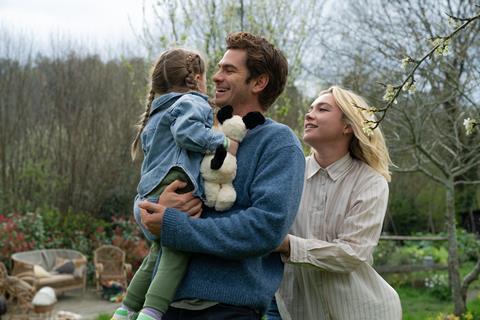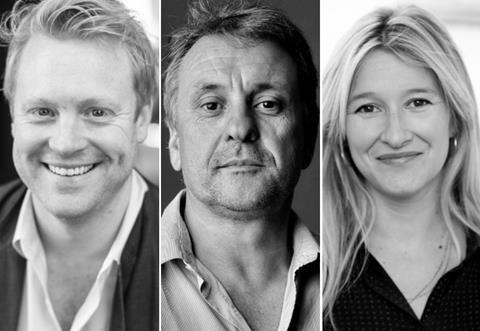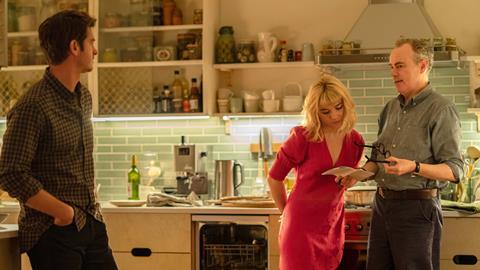When SunnyMarch commissioned playwright and screenwriter Nick Payne to adapt a book they had in development with Studiocanal, the UK production company might have been fazed by the creative pivot he eventually proposed. “He turned around one day and said, ‘Can I do something else? I’ve got a better idea, and I really, really want to do it.’”
SunnyMarch head of film Leah Clarke is relating the course of events that led to the creation of contemporary British romantic drama We Live In Time, scripted by Payne, directed by John Crowley (Brooklyn), produced by SunnyMarch in association with Shoebox, and starring Andrew Garfield and Florence Pugh.
“We were delighted at the idea of Nick doing an original for us, especially something that was romantic and meaningful,” adds Clarke. SunnyMarch took the proposal back to Studiocanal, “and they were very gracious, and were up for it”.
That smooth course of events might seem surprising, given the current focus on adapting existing source material or biographical/historical subjects for the screen – which in Studiocanal’s case include recent hits Back To Black, Wicked Little Letters and The Outrun. And Clarke agrees it was hard to pitch comp titles for the film to Studiocanal and fellow backers A24 (which has North American rights) and Film4. She mentions Silver Linings Playbook and Blue Valentine.
“But those films are American, and that kind of indie [original romantic drama] space doesn’t really exist here [in the UK]. So the only way it was going to get made is if it had two big stars who had terrific chemistry.”
SunnyMarch’s next step was to attach a director, and it reached out to Crowley, director of Payne’s play The Same Deep Water As Me at the Donmar Warehouse in 2013. Payne is best known for play Constellations, which was first produced at the Royal Court Theatre in 2012 and offers a playful perspective on love while stirring in fizzy ideas about science and cosmology as well as a storyline involving terminal illness and assisted dying.

We Live In Time might be said to occupy similar tonal territory, using jumbled chronology to tell the story of chef Almut (Pugh) and freshly divorced breakfast-cereal executive Tobias (Garfield) navigating divergent priorities that come to a head after Almut develops ovarian cancer, and must eventually decide how best to spend her fast-dwindling time. The pair meet when Almut knocks down a frazzled Tobias in the road and drives him to hospital.
“I love Nick’s writing and the vividness of scene to scene was immediately potent,” says Crowley, recalling how he first received the screenplay in 2021. “I was a little resistant to how sad I felt it was on my first reading.”
We Live In Time unfolds, non-chronologically, through three different time periods, which Crowley explains as “one day running against six months running against five years”. And it is the “one day” portion of the film, where Almut ends up giving birth in a petrol station disabled toilet after the pair are caught in New Year’s Eve gridlock traffic on the way to the hospital, that first hooked Crowley.
“It knitted all the tones together,” he says. “I was laughing out loud at how funny it is, and then I was deeply moved, and it was all held together by the absurdity of the situation.”
The screenplay, he adds, “pertains to a bigger question, which is what it feels like and what it means to be alive. It was a very rich territory wrapped up in quite a light, playful, contemporary, relatable film. It occupied a sweet spot between a lot of things which don’t get made.”
Helping Crowley imagine that this film would get made, says the filmmaker, was the fact “it did have in its favour two brilliantly written and eminently castable roles”. For male lead Tobias, the director’s thoughts turned towards an actor he had cast in 2007 Channel 4 drama Boy A, but had never had the opportunity to work with again.
“As a human being,” says Crowley of Andrew Garfield, “he is somebody who’s very at ease in his emotions, and certainly as an actor, his huge wellspring, creatively, is emotion. In Tobias, you have a gentle, emotionally in-touch bloke who’s not soppy. Somebody who’s comfortable with the fact his wife is the star in the relationship, and isn’t threatened by that.”
Tobias works (unglamorously) for British cereal brand Weetabix. “There were elements in him which I felt could be mistakenly over-characterised – Mr Weetabix man – but in Andrew’s hands they would simply be believable. He’d do them and he’d throw them away.”
Florence Pugh was an obvious candidate for Almut, but the in-demand actress was committed to Marvel film Thunderbolts* and other roles. Just as Crowley and his casting director wife Fiona Weir were about to move on, “rather sadly and half-heartedly”, news came that the Thunderbolts* shoot had slid back and Pugh had a window, one that coincided with Garfield’s. The challenge was that this window was imminent, meaning We Live In Time had to jump into full pre-production right away.
“It was quite an exciting seven weeks to put it together in that amount of time,” deadpans Shoebox’s Guy Heeley, who had been invited by SunnyMarch to partner as a producer on the film.
Capital gains

Payne lives in Herne Hill in south London and had set much of the story there. The filmmaking team decided to stick with this choice.
“It’s a London we don’t often see on film,” explains Heeley. “We were not showcasing a London with Tower Bridge in it. We were always seeing a London that felt like lived-experience London – which was important to our characters, who were having a very lived-experience time in their lives.”
Pugh’s firm intention for Almut, announced at the first meeting, was to have Tobias cut her hair for real in the film, rather than wear an array of wigs. This added veracity, saved time in hair and make-up, and helped Pugh’s performance, but also dictated the shooting order of scenes.
“We needed to not only find locations that worked creatively, not only were available, but all had to fit in the jigsaw puzzle of Florence’s journey of hair,” says Heeley. The film shot for 34 days, beginning late March 2023.
A jumbled chronology was baked into Payne’s script, but when it came to the edit with editor Justine Wright, after seven or eight weeks of artful trimming, “it was not quite playing, we had to break it all apart and almost start from scratch with the structure”, reveals Crowley. And with a fractured structure, the possibilities suddenly seemed limitless.
“That’s always a scary moment,” he adds. “It’s like coming up a sheer cliff. But you get a foothold, and you get another one, you piece your way forward. We were trying to make everything feel inevitable and all happening in the right place at the right time.”
We Live In Time premiered at Toronto in September, with A24’s North American October release achieving a healthy $24.6m box office at press time; Studiocanal releases the film in UK cinemas on January 1.
While recognising the commercial challenges of any original story in the marketplace, SunnyMarch co-owner Adam Ackland, who produces We Live In Time alongside Clarke and Heeley, always had confidence that audiences would relate to a story about making life choices when time suddenly seems finite – not from personal experience, necessarily, but from their own family or friendship group. The poster tagline, “Every minute counts”, leans into this idea.
“I think, unfortunately, there aren’t that many people who it wouldn’t speak to,” says Ackland. “Yes, it’s a difficult thing to sell because there’s absolutely sadness that runs through it, but it speaks of love and humanity. We always felt, if you get it right, this could be really special.”






![The Brightest SunScreen[Courtesy HKIFF]](https://d1nslcd7m2225b.cloudfront.net/Pictures/274x183/3/5/0/1448350_thebrightestsunscreencourtesyhkiff_312678.jpg)



















No comments yet